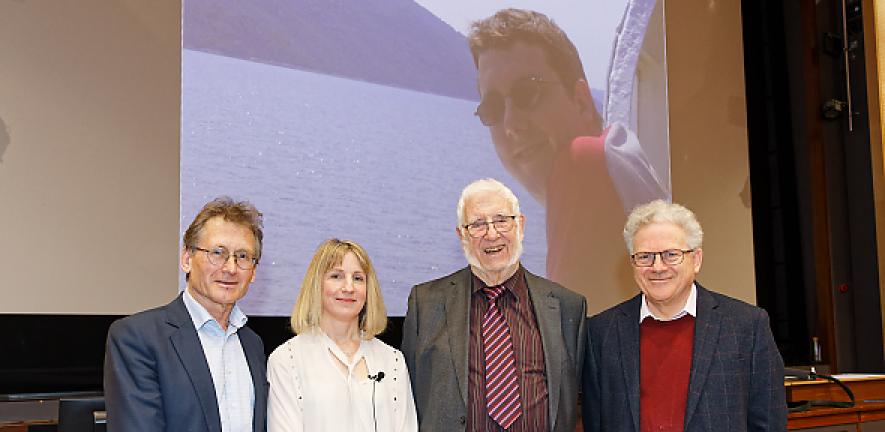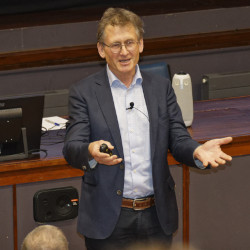
Alex Hopkins was an undergraduate in Natural Sciences, who went on to complete a PhD with Professor Dominic Wright. After finishing his studies, he became a Teaching Fellow in Inorganic Chemistry at Churchill College.
Infectious personality
Alex’s humour and warmth, such important parts of who he was both as a scientist and as a person, proved to be infectious with students. He was a hugely popular lecturer, supervisor and mentor. He inspired students to learn about the Lanthanoids and Actinoids via a mnemonic competition to find the catchiest rhyme to plot the order of the elements. He also gave students the chance to boost their vitamin intake if they correctly answered a trivia question in order to win a fruit- or vegetable-related scientist lecture prize. Famous scientists who featured included Pear and Marrow Curie and Louis Pasteur-nip!
Memorial lecture
Alex died of cancer in 2006 aged just 30. This lecture series was set up with generous support from his father John Hopkins to celebrate Alex’s life and to remember his contribution to this Department and to Churchill College.
A personal journey
 Professor Feringa explored the complexity of modern machines in terms of the periodic table: which elements are represented in the human body versus a smart phone, and why we need to think carefully about the abundance of elemental raw materials on the Earth as we develop the technologies of the future.
Professor Feringa explored the complexity of modern machines in terms of the periodic table: which elements are represented in the human body versus a smart phone, and why we need to think carefully about the abundance of elemental raw materials on the Earth as we develop the technologies of the future.
Ben’s personal journey of discovery from his family farm in the Netherlands (where there is now a street named in his honour), to the Nobel Prize ceremony in Stockholm, was interwoven with his extraordinary scientific achievements, which involve dynamic molecular systems including the control of rotary motion, the synthesis of nano-cars, and light-activated antibiotic switches to give just a few examples.
Advice to younger scientists
Ben also shared his passion for teaching with the audience and offered advice to younger scientists to accept that experimental work can be difficult and is reliably unpredictable! He presented his own work as a mixture of exceptional insight and careful planning interspersed with serendipity. Sometimes the unexpected can be more interesting than the expected!
Ben was awarded the 2016 Nobel Prize in Chemistry along with Professors Sir Fraser Stoddart and Jean-Pierre Sauvage, for the design and synthesis of molecular machines.
It was truly an honour to have Ben lecture in Alex’s memory. He presented inspirational science with modesty, humour and great warmth, mirroring Alex’s personality and passion for chemistry. A fitting tribute.
Thank you to Dr Sally Boss for writing this article and to Professor Jeremy Sanders for his contributions to the article.

